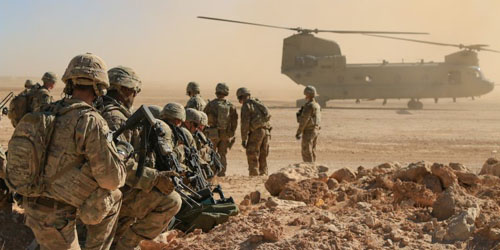by WorldTribune Staff, April 4, 2019
Iran had a hand in the killing of hundreds of American troops in Iraq since 2003, according to the U.S. State Department.
“In Iraq, I can announce today, based on declassified U.S. military reports, that Iran is responsible for the deaths of at least 608 American service members,” Brian Hook, U.S. Special Representative for Iran, said during a State Department briefing on April 2.

“This accounts for 17 percent of all deaths of U.S. personnel in Iraq from 2003 to 2011,” Hook said. “This death toll is in addition to the many thousands of Iraqis killed by the IRGC’s proxies.” Since 2003, more than 4,400 U.S. service members have been killed in Iraq.
A large number of U.S. troops were killed by highly lethal bombs, known as explosively formed projectiles, or EFPs, that Iran manufactured and supplied to Shi’ite militias in Iraq, the State Department said. Many EFPs were powerful enough to destroy U.S. Humvees and even breach tank hulls.
The newly declassified number provided by the State Department, holding Iran responsible for the deaths of 608 U.S. service members in Iraq, is more than one hundred deaths higher than the previous estimate.
During an August 2015 Senate Armed Services Committee, Sen. Ted Cruz pressed then-Secretary of Defense Ash Carter to make the numbers public. “I understand that the Joint Personnel Recovery Agency has a classified list of roughly 500 American soldiers … I would ask, Secretary Carter … that the Defense Department release that list to every member of this committee, declassify that list and release it directly to the service members’ families who were murdered by [Iranian] General Soleimani,” Cruz said.
Qasem Soleimani, 62, is a major general in the Iran’s Islamic Revolutionary Guard Corps (IRGC). Since 1998, he has been commander of its Quds Force, a division primarily responsible for overseas military and clandestine operations.
During the April 3 press briefing, Hook also gave an update on Trump administration’s efforts to confront the Iranian regime.
“Since taking office, the administration has designated over 970 Iranian entities and individuals. The sanctions announced last week against front companies supporting the Islamic Revolutionary Guard Corps and Iran’s ministry of defense were the 26th round of American sanctions,” Hook said. “Our sanctions have targeted a range of threats, especially Iran’s support of terrorism, missile proliferation, its nuclear program, human rights abuses, and others.”
Hook said the U.S. had placed sanctions against more than 70 financial institutions linked to Iran, targeted the oil shipping networks that Iran was illicitly using to fund its Syrian ally Bashar Assad and its terror proxy Hizbullah, and visited over 50 different countries to warn against doing business in Iran.
Hook said nearly a year after the U.S. withdrew from the Joint Comprehensive Plan of Action, also known as the Iran Deal, the actions that the Trump administration has taken have helped contain Iran’s activities, including its ability to fund terrorism and to prop up its allies and proxies in the region.
“As we have done from the start, we will continue to call on all nations to join us in restoring the basic demands on Iran to behave like a peaceful nation. This includes ending its pursuit of nuclear weapons, stop testing and proliferating ballistic missiles, stop sponsoring terrorist proxies, and halt the arbitrary detention of dual citizens,” Hook said.
Hook also said that three of the eight countries to which Washington granted waivers to import Iranian oil have now cut their shipments from the country to zero.
Hook did not identify the countries.
Washington has granted Italy, Greece, Turkey, China, India, Japan, South Korea, and Taiwan temporary waivers to import Iranian oil.
The New York Times reported late last month that Iran’s ability to fund its allies and terror proxies has suffered greatly under the Trump administration’s sanctions.
“Syrian militiamen paid by Iran have seen their salaries slashed. Projects Iran promised to help Syria’s ailing economy have stalled. Even employees of Hizbullah, the Lebanese group that has long served as Iran’s closest Arab ally, say they have missed paychecks and lost other perks,” the report said.
“The golden days are gone and will never return,” said a fighter with an Iranian-backed militia in Syria who recently lost a third of his salary and other benefits. “Iran doesn’t have enough money to give us.”
Your Intel Brief: Geostrategy-Direct __________ Fix The Media Now
